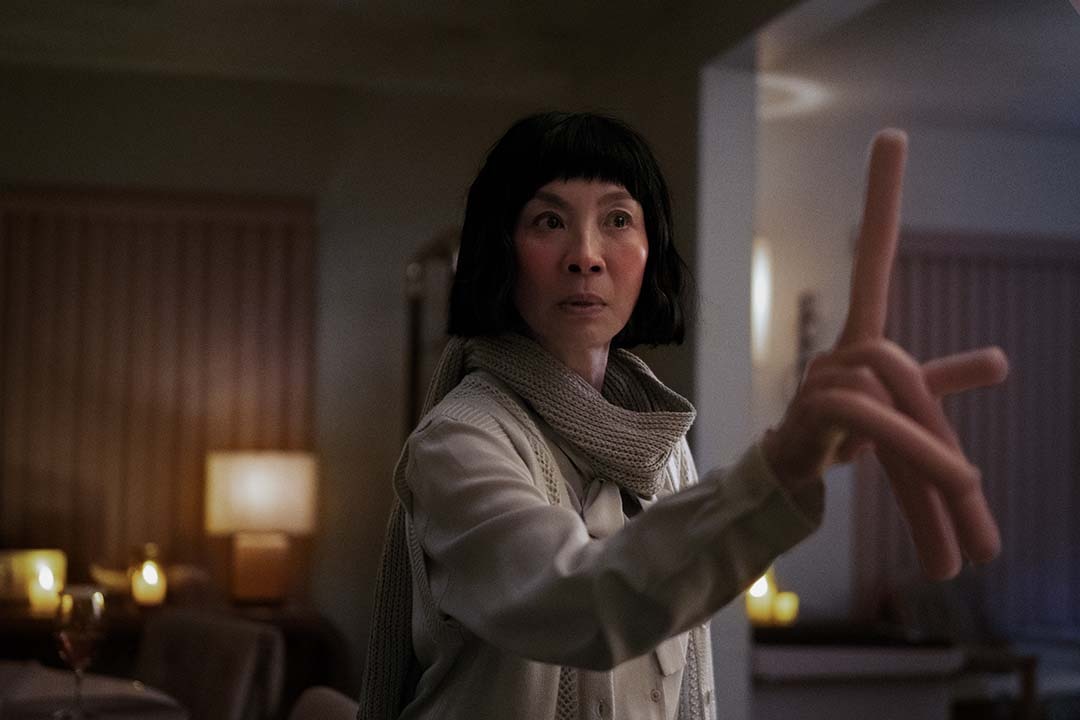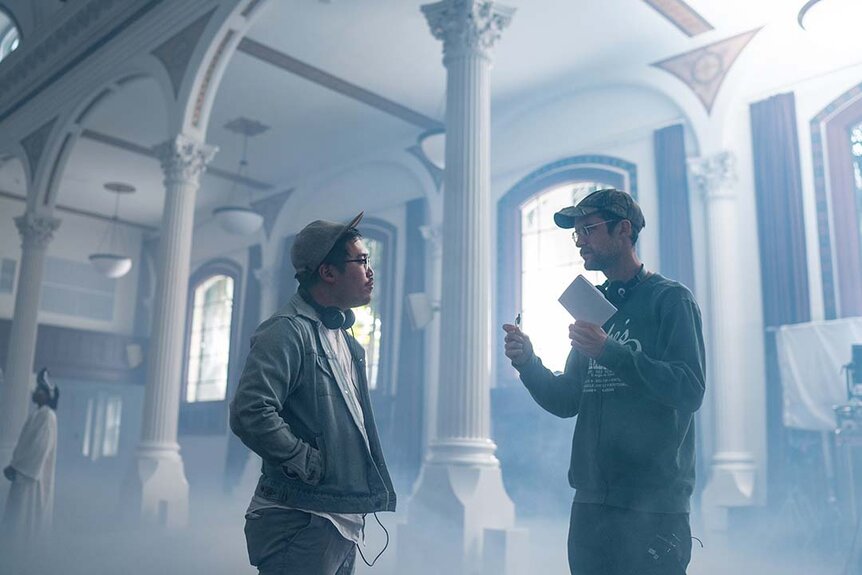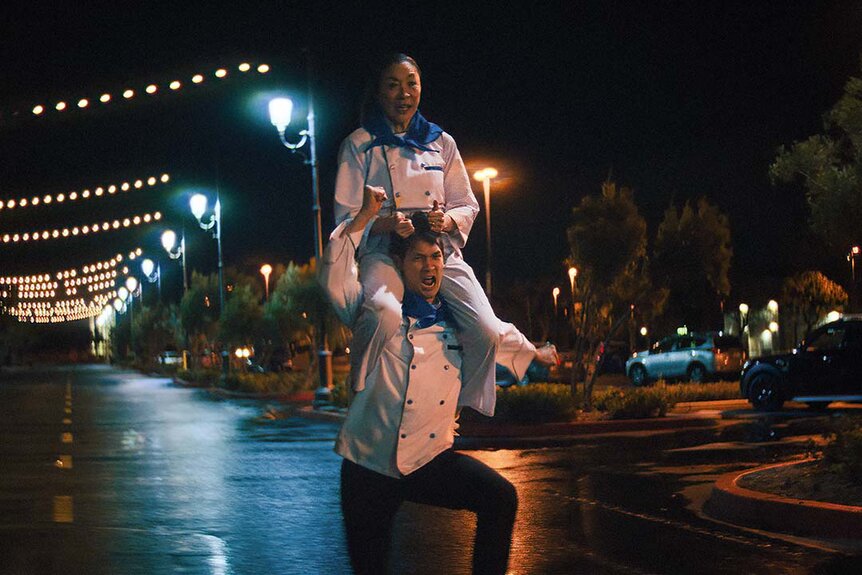Create a free profile to get unlimited access to exclusive videos, sweepstakes, and more!
'Everything Everywhere' editor on weaving a Michelle Yeoh multiverse: 'It was a huge puzzle'
From hot dog fingers to hibachi raccoons, this project is one of the most brazen pieces of filmmaking in recent memory.

From hot dog fingers, to hibachi raccoons, to everything bagel-themed singularities, there's no denying that Everything Everywhere All at Once is one of the most brazen and unique pieces of filmmaking in recent memory.
Daniel Scheinert and Daniel Kwan's Michelle Yeoh-anchored trip through the multiverse (one that by all accounts outshines a similar Marvel production that opened not long after) represents the endless possibilities of cinema as a medium. It unceremoniously shoves the audience out of their franchise-heavy comfort zone to deliver a theatrical experience like no other.
"I was very scared. I'd never taken on anything of this amount of ambition and this scale of filmmaking," the film's editor, Paul Rogers (a longtime friend and collaborator of Daniels), tells SYFY WIRE of his initial encounter with the bizarre script. "I had to separate my editor brain from my moviegoer brain and just try to lean on my excitement as an audience member the first time I read it. So I wouldn't get overwhelmed trying to figure out how this was all going to pan out. Because it's pretty clear when you read the script, there's just an enormous undertaking and a lot of responsibility was going to rest on the edit — as well as all the other departments — to pull it off."
Before a single frame was shot, however, the co-directors acted out the story for Rogers, "so I had a good grasp on the tone and the whirlwind pace of the thing," he explains. "But also the emotional weight of it because I was very emotional when they did that pitch and I was in tears at the end of it ... They have this ability to turn serious matters into a joke and turn jokes into serious matters."
At its core, Everything Everywhere is a heartwarming tale of love, acceptance, and generational friction. For all its moments of dimensional whiplash that give the project its novel identity, the Daniels never wanted the multiversal aspect to become the only focus. "In a way, those moments in the film are more window dressing for what this story actually is, which is a powerful story," Rogers adds.
Nevertheless, he still had to figure out a way to make sense of Evelyn's jumps to different realities without ever losing the viewers. "It was a huge puzzle ... We tried to take each multiverse jump on its own merit and and not repeat ourselves too much. There were certain devices that we started to use that helped the audience know what was happening, but [with] each one, we would try to be little more inventive with, or tailor it specifically, to what the moment was or what the emotion was as Evelyn was going from universe to universe."
One such strategy was to lean into familiar "genre tropes" of the dimensions depicted onscreen:
"If we were jumping into the Alphaverse — which is the action movie universe — or we're jumping into the family drama universe, which is kind of the Lifetime movie universe, we knew that there are these things that can activate a little switch in the audience that says, ‘Okay, I know what this genre is. I know what to expect.' That was kind of a centering and a gift to the audience. Because as crazy as this movie gets and as much as it's jumping all over the place, it's nice for the audience to feel like they're keeping up and they're clued in on what's happening a little bit, while also surprising them."
The pandemic lockdown forced post-production to go completely virtual (the team relied on the Productions feature in Adobe Premiere Pro to remain in sync), but did come with a silver lining: Rogers had nearly a full year to edit the footage.
Early on in the process, he put together the first assembly cut, expecting it to be unwatchable and in need of serious refinement. "We screened it, not expecting much and expecting to be disappointed and stressed out," he says. "We looked at each other at the end of it on Zoom and we were like, ‘Are we crazy or is this working well and way better than we thought?’"
RELATED: Everything Everywhere All at Once directors are 'interested' in the backlash
The final cut turned out to be the little indie feature that could, racking up critical acclaim (a near-perfect score of 95 percent on Rotten Tomatoes) and $100 million at the box office (it currently stands as the highest-grossing title in the A24 catalogue) — all whilst embedding itself deep within the cultural zeitgeist. Rogers knew the film had struck an unexpected chord with audiences when the phrase "Everything Everywhere All at Once" was utilized for an Anderson Cooper news segment on CNN.
"They were using it as a tagline to talk about congressional budgets or something. And I was like, ‘Wow! It’s entering the cultural lexicon. That is pretty crazy,'" the editor remembers. "And obviously, just occasionally, overhearing someone at the store talk about it. Just these weird little ways it started seeping into our everyday lives."
The project has also been at the forefront of awards season buzz, with many expecting it to take home major gold at this year's Academy Awards. If the film does take home the top prize of the night, it will become perhaps the first sci-fi release to win Best Picture in the history of the nearly 100-year-old ceremony. To date, The Silence of the Lambs, The Lord of the Rings: The Return of the King, and The Shape of Water have been the only overt genre pictures to land such a high accolade in the century-old history of the annual ceremony.
The pressure may seem enormous, but Rogers is "very psychologically and emotionally prepared" to not receive an Oscar nod for his contributions, let alone an actual victory. "I feel completely unprepared for the inverse of that to happen," he admits. "So basically, I need to start going to therapy just in case — by some miracle — this wins an award or I win an award."
Even if a nomination is in the cards, the editor feels like he and the rest of the production team already hit the jackpot. "I want as much as I can to preserve that family feeling of when the movie first came out and we were all celebrating as a unit that the world liked it. And to remember that that's the real victory. That was the real moment that we ‘won,’ is when people liked the movie and it moved to them."
While the movie perfectly stands on its own, Hollywood can't help but turn breakout hits into multimedia franchises. Everything everywhere (pun very much intended) needs a cinematic universe these days. Rogers affirms there hasn't been any talk of a sequel, but does point to an interview with The Guardian, in which Scheinert states that he and Kwan have "a lot of spiritual sequel ideas."
"Something that another filmmaker does that's original, but is kind of in the same world," the editor concludes. "I like that idea. I don't know what else they would do with these characters in this world. I'm sure it'd be amazing, but knowing them, they've already moved lightyears beyond to some other weird area that they're going to surprise everybody with next."
In the mood for more original sci-fi cinema that'll make your head spin? Jordan Peele's Nope is currently streaming on Peacock.




























